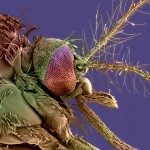Link to Pubmed [PMID] – 29842982
Infect. Genet. Evol. 2018 May;
Mosquito-borne viral diseases (MBVDs) have a complex biological cycle involving vectors and vertebrate hosts. These viruses are responsible for many deadly diseases worldwide. Although MBVDs threaten mostly developing countries, there is growing evidence indicating that they are also of concern in western countries where local transmission of arboviruses such as West Nile, Zika, Chikungunya and Dengue viruses have been recently reported. The rapid rise in human infections caused by these viruses is attributed to rapid climate change and travel facilities. Usually, the only way to control these diseases relies on the control of vectors in the absence of licensed vaccines and specific treatments. However, the overuse of insecticides has led to the emergence of insecticide resistance in vector populations, posing significant challenges for their control. An alternative method for reducing MBVDs can be the use of Transmission Blocking Vaccines (TBVs) that limits viral infection at the mosquito vector stage. Some successes have been obtained confirming the potential application of TBVs against viruses; however, this approach remains at the developmental stage and still needs improvements. The present review aims to give an update on MBVDs and to discuss the application and usage of potential TBVs for the control of mosquito-borne viral infections.

